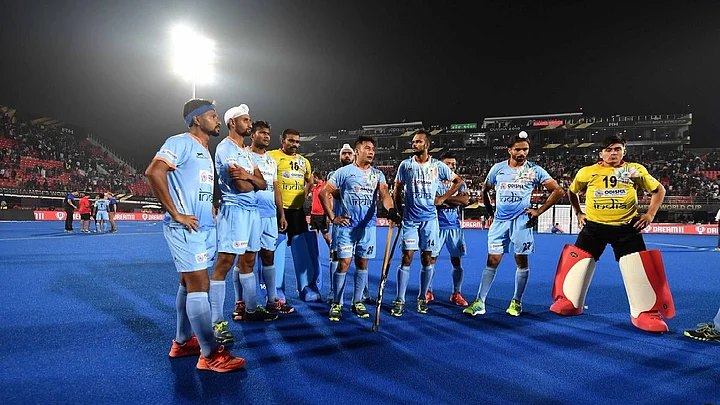India’s dream of a first Hockey World Cup medal in over four decades will have to wait longer after going down to Netherlands in the quarter-finals of the 2018 edition at Bhubaneswar on Thursday, 13 December.
A packed Kalinga Stadium was witness to the host nation’s hopes being crushed as the Dutch, three-time world champions, came from behind to win 2-1 and set up a semi-final against holders and world number one Australia.
India had taken a 12th-minute lead through Akashdeep Singh’s second goal of the tournament, only for Netherlands to equalise three seconds before the end of the first quarter with Thierry Brinkman executing a deft deflection.
Mink van der Weerden then converted a final-quarter penalty corner, with just over 10 minutes on the clock, to break Indian hearts.
India have now failed to reach the semi-final stage since winning their only World Cup title in 1975.
India Pay For Defensive Lapses
There was no doubting India’s fight in what was a fiercely-contested tie between the world’s fourth and fifth-ranked sides. But in the final calculations, two defensive errors cost India a semi-final berth – the latter of the two in particular.
Amit Rohidas’ ill-timed attempt to block a penalty corner at the start of the final quarter resulted in a Dutch retake with India allowed one lesser man in the defensive wall. It proved fatal, as van der Weerden was able to pierce the gap and find the back of the net past goalkeeper PR Sreejesh.
Netherlands’ equaliser, at the stroke of the whistle for the first quarter, was the result of a momentary switch-off on part of the Indian defense. Barely 120 seconds after India had taken the lead, Brinkman was left virtually by himself to nick the faintest of deflections from a long ball to leave Sreejesh stranded.
No End to Dutch Jinx
India remain winless against Netherlands at the World Cup after six meetings with the Dutch in the competition’s 47-year history. Victory in Bhubaneswar was Netherlands’ fifth outright win in WC matches against India, with the sixth a penalty shootout win to clinch the 1973 final at Amstelveen.
But a momentous occasion, with the hosts seeking a high they had failed to taste in 43 years, had begun much more promisingly than previous World Cup ties versus the three-time champions.
A 12th-minute penalty corner was India’s first real opportunity on the night, and they pounced upon it. Akashdeep was quick to react from a rebound after Harmanpreet Singh’s initial flick had been saved by Pirmin Blaak in the Dutch goal.
Defensively, Kothajit Singh produced an immense display to deny the Dutch on numerous occasions with timely interceptions.
The hosts very nearly restored their advantage before half-time, with Nilakanta Sharma shooting wide from a rebound after Akashdeep's deflection was kept away by Blaak.
Four minutes into the second half, Akshdeep had a golden chance to restore India's lead but his reverse hit from a long ball of Harmanpreet Singh sailed over the Dutch goal.
But Netherlands came out with a clearly laid-out plan in the final quarter, and didn’t allow India any leeway in attack. Tight man-marking from the Dutch made it difficult for India build any promising surges up front, and Netherlannds upped the ante at the other end – eventually finding a reward.
India threw the kitchen sink in an attempt to find a levelling goal, putting numbers up-front and even withdrawing Sreejesh for an extra outfield player. But the moves didn’t pay any dividend, and it wasn’t to be for the Harendra Singh-coached side.
Netherlands will now bid to prevent champions Australia from entering a fifth successive final, while world number three Belgium take on England – surprise conquerors of Olympic champions Argentina. Both semi-finals are scheduled for Saturday, 15 December, with the summit clash to follow a day later.
(With inputs from PTI)
(At The Quint, we question everything. Play an active role in shaping our journalism by becoming a member today.)
